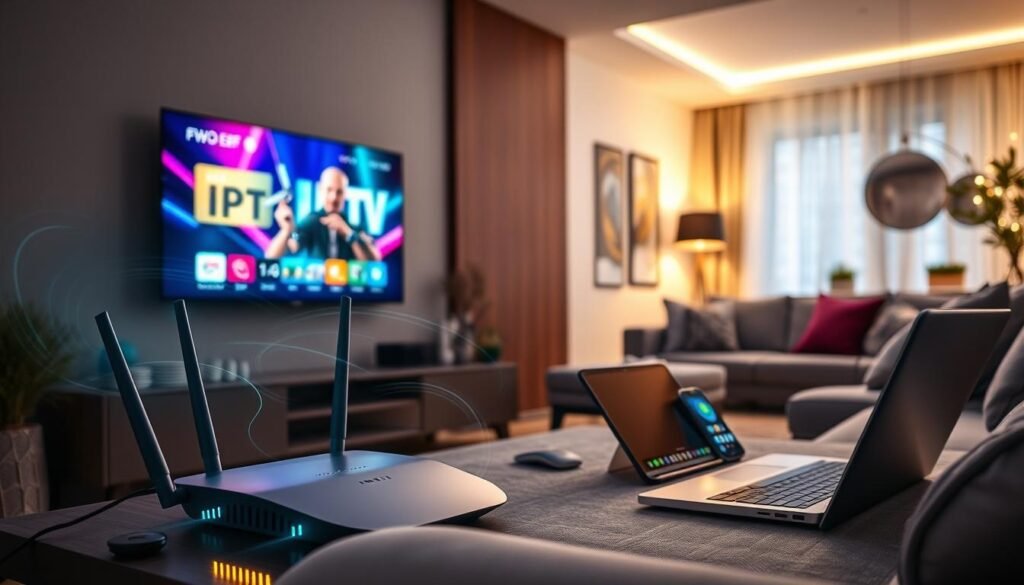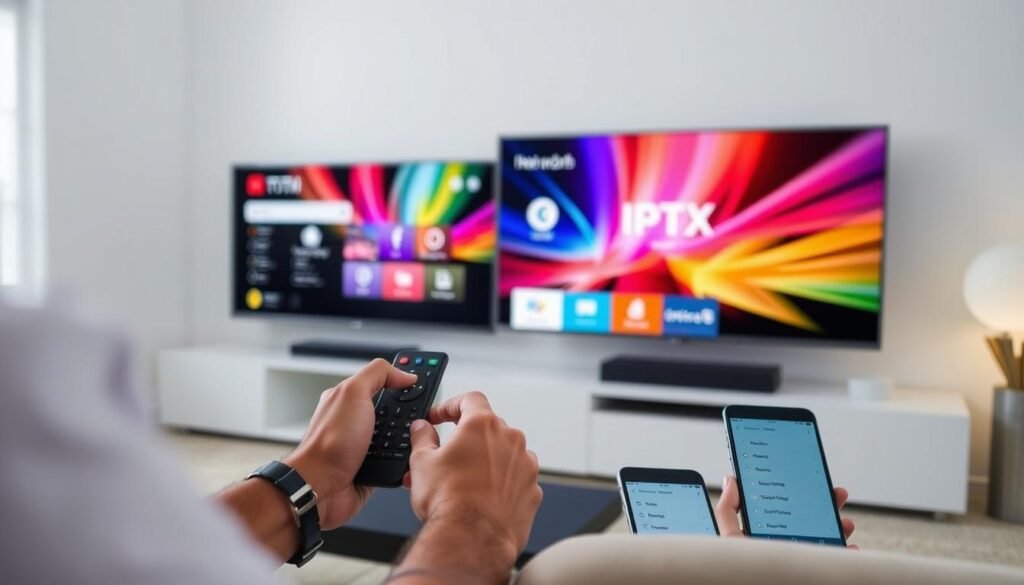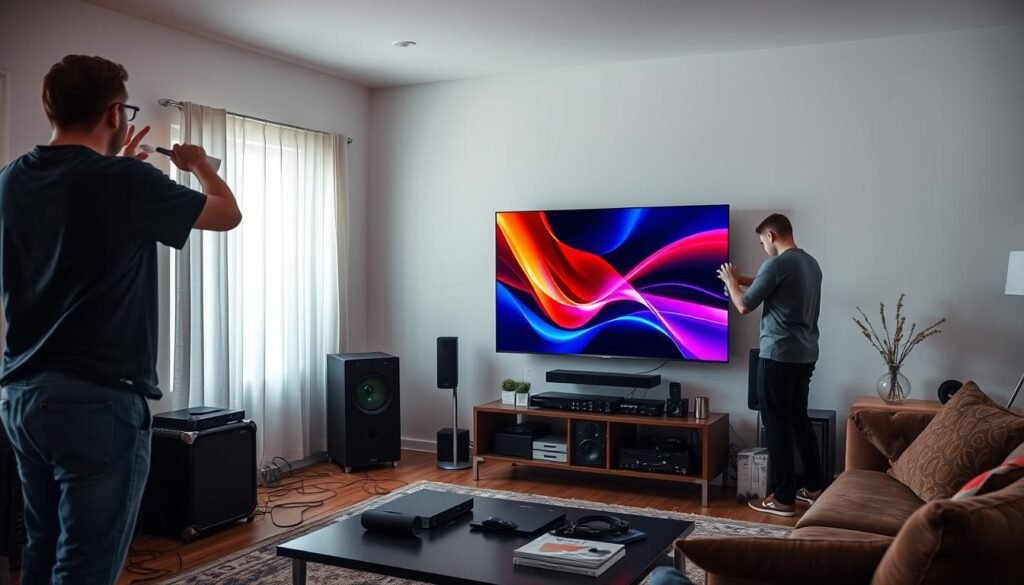Welcome to the 2025 IPTV performance guide. Here, we explore effective ways to boost your streaming quality. IPTV is always getting better, so knowing what affects your experience is key. This guide gives you top tips to ensure smooth streaming on all devices. Want to try IPTV? Reach out to WatchMaxTV for a fast start on your free trial. Discover better entertainment today.
Key Takeaways
- Understanding IPTV technology is essential for enhanced streaming.
- Internet speed and bandwidth significantly affect IPTV performance.
- Device compatibility plays a crucial role in streaming quality.
- Optimizing your network can mitigate issues like congestion.
- Regular maintenance is key to consistent viewing experiences.
- Investing in quality hardware can lead to significant improvements in performance.
Understanding IPTV Streaming Technology
IPTV technology is key for those exploring the future of TV content delivery. IPTV or Internet Protocol Television streams shows directly to you using the internet. This way, you get your favorite programming easily.
What is IPTV?
IPTV changes the game from old-school broadcast methods like satellite or cable. Instead of using radio waves or cables, it uses the internet to stream channels and content. IPTV lets you watch live TV, videos on demand, and more on different devices.
How Does IPTV Work?
Understanding how does IPTV work is simpler if you know its parts. It works by sending data over the internet. Your shows are turned into digital format and sent over your internet connection. Thanks to this tech, you can watch live TV, record for later, or choose video-on-demand, making your TV time more flexible than ever.
Factors Affecting IPTV Performance
For a smooth streaming experience, understanding IPTV performance factors is key. It’s important to look at internet speed, bandwidth, the devices used, and even network congestion. Knowing these factors helps make watching IPTV better.
Internet Speed and Bandwidth
Internet speed and bandwidth are crucial for IPTV. They must be high to stream HD content well. If not, you might face buffering or other annoyances. For the best experience, aim for at least 25 Mbps. This is especially true when many devices are connected.
Device Compatibility
Understanding which devices work best with IPTV is vital. Some older TVs or devices might not support the latest formats or resolutions. Check your device’s compatibility with your IPTV provider’s requirements for the best performance.
Network Congestion
When lots of people go online at once, the network can get congested. This may slow down your streaming. Try testing your internet speed during busy times. Consider streaming when fewer people are online. This small change can greatly improve your IPTV experience.
IPTV Performance Guide
Understanding IPTV’s common performance issues is crucial for a great viewing experience. Users often face various challenges that affect streaming quality. This section discusses these issues and offers insights on effective troubleshooting.
Common Performance Issues
IPTV users often experience specific issues that disturb their service. Some common problems include:
- Buffering: A delay in streaming content, caused by slow internet or network congestion.
- Pixelation: Loss of picture quality, usually due to low bandwidth or poor signal.
- Frequent Disconnects: Sudden streaming interruptions, mainly due to unstable internet connections.
- Audio Sync Issues: Audio and video mismatch, occurring from coding issues or network delays.
Diagnosing Streaming Problems
Diagnosing streaming issues correctly can help fix performance problems. Steps include:
- Checking Internet Speed: Use tests to ensure your internet speed is sufficient.
- Reviewing Network Congestion: Identify times when streaming quality may worsen.
- Inspecting Device Compatibility: Ensure your device works well with IPTV services.
- Updating Your IPTV Application: Regular updates can improve performance and introduce new features.
| Issue | Symptoms | Possible Causes | Solutions |
|---|---|---|---|
| Buffering | Delayed playback, interruptions | Slow internet speeds, high usage | Upgrade your plan, limit network usage |
| Pixelation | Blurry images, broken visuals | Poor signal quality, low bandwidth | Check wiring, boost signal |
| Frequent Disconnects | Loss of connection | Unstable internet, hardware issues | Restart router, use wired connection |
| Audio Sync | Delayed sound, inconsistent playback | Encoding errors, network delay | Reboot devices, adjust settings |
Optimizing Your Internet Connection for IPTV
To have the best IPTV experience, making sure your internet is up to speed is key. What internet plan you choose and the type of connection matter a lot for streaming quality. Here’s some advice to get the best out of your setup.
Choosing the Right Internet Plan
Picking an internet plan should be based on your streaming habits. If you just browse the web, a basic plan might work. But for watching high-definition videos, you’ll need more speed. You should get a plan with at least 25 Mbps for HD shows. Below is a table that shows different internet plans:
| Internet Plan | Speed (Mbps) | Recommended for |
|---|---|---|
| Basic | 10-25 | Standard Definition Streaming |
| Standard | 25-50 | High Definition Streaming |
| Premium | 50+ | 4K Streaming and Multiple Users |
Using a Wired Connection vs. Wi-Fi
Choosing between a wired connection and Wi-Fi impacts your IPTV experience. A wired connection is more stable and faster, which means less lag. However, Wi-Fi gives you the freedom to move around. It can be slower if many devices are connected. Here are some tips:
- Wired Connections: They’re better for streaming, especially live events.
- Wi-Fi: Offers flexibility but might not work as well far from the router.
- Hybrid Setup: Use a wired connection for your main device and Wi-Fi for others.

Quality of Service (QoS) Settings for IPTV
To make your IPTV experience better, you need to tweak your network settings. A critical area to look at is the Quality of Service (QoS) settings. They help manage your network’s bandwidth to give you a smooth streaming experience. Knowing how to make IPTV traffic a priority can greatly improve what you watch.
Configuring Your Router
Start by getting into your router’s admin page. Just type the router’s IP address into your browser. You might enter 192.168.1.1 or 192.168.0.1. Once you’re in, find the QoS settings in the advanced section. This is where you can set rules to better support IPTV streaming. Remember to save your changes once you’re done.
Prioritizing IPTV Traffic
It’s also important to make your IPTV traffic a top priority in your QoS settings. This means finding your IPTV device’s MAC address or IP address. Then, you give it a higher priority over other devices. This stops lag and buffering, making your watch time enjoyable. When set up right, your router will focus resources on your IPTV. This ensures a non-stop, high-quality viewing time.
Device and App Settings for Enhanced Performance
To make the most of IPTV services, adjusting your device and app settings is key. These changes can boost streaming quality and cut down on playback issues. Keeping your IPTV app updated and fine-tuning settings ensures smooth watching.
Updating Your IPTV Application
It’s vital to keep updating your IPTV application to enjoy new features and better performance. While most apps update automatically, it’s smart to manually check sometimes. Follow these steps for an update:
- Open the application store on your device.
- Search for your IPTV application.
- If an update is available, select the update option.
Regular updates fix bugs and enhance app functionality. This leads to improved device performance.
Adjusting Encoding Settings
The encoding settings in your app impact streaming quality and speed. Adjusting these properly can stop buffering. Regularly check and tweak your encoding settings:
- Navigate to the app settings menu.
- Locate the encoding or video settings section.
- Set resolution and bitrate according to your internet speed.
Optimizing these settings betters your streaming experience. It makes IPTV performance smoother and more dependable.

| Encoding Setting | Recommended Value | Impact on Performance |
|---|---|---|
| Resolution | 1080p | High quality but requires good bandwidth |
| Bitrate | 5-8 Mbps | Balanced streaming experience |
| Frame Rate | 30-60 fps | Smoother playback |
Improving Streaming Performance with Hardware Upgrades
Improving your IPTV can be easy with the right hardware upgrades. A top-notch router and a signal booster can make a big difference. They help your streaming go smoothly with less buffering.
Investing in a High-Quality Router
For great streaming, you need a good router. These routers handle fast speeds and cover more space, giving you a steady connection. When picking a router, look for key features:
- Dual-band or tri-band support for managing more devices.
- Quality of Service (QoS) options that make streaming a priority.
- Latest Wi-Fi standards like Wi-Fi 6 for top performance.
Using a Signal Booster
Is your router too far away or blocked by walls? A signal booster can fix that. It increases the reach and quality of your signal, enhancing your streaming. Here’s what to keep in mind with a booster:
- Put it where it can get a strong signal from your router.
- Make sure it works well with your network for the best results.
Importance of Regular Maintenance
Regular maintenance is crucial for the best IPTV performance. It includes tasks that boost usability and streaming quality. Doing this regularly helps prevent interruptions, ensuring a smooth viewing experience.
Clearing Cache and Cookies
Clearing cache and cookies helps your device run better. Over time, stored data can make your IPTV app slow, leading to pauses or freezes. By regularly freeing up space, whether you’re using VLC or Kodi, you get smoother streaming. It’s good to remind yourself to do this every month.
Rebooting Devices and Routers
Rebooting devices is key for top performance. Many people forget this step, but it fixes a lot of internet problems. Restarting your router gets rid of temporary data, helping keep your internet stable. Doing regular reboots of both router and media player helps avoid issues. This is especially true for services mentioned in IPTV Free M3U Playlists.

Future Trends in IPTV Technology
The world of IPTV technology is constantly changing, bringing new trends that aim to improve how we watch TV. With better streaming quality on the horizon, viewers will see clearer pictures and hear better sound. This will take the TV watching experience to a whole new level.
Advancements in Streaming Quality
Streaming quality is getting a lot of attention in the IPTV world. We are seeing more of 4K and 8K resolution, making everything look really sharp. This means shows and movies look more lifelike, pulling viewers into the action like never before. On top of that, new ways to compress video help use data more efficiently while keeping the picture great.
The Role of 5G and Fiber Optics
5G technology and fiber optics are key to the future of IPTV. 5G’s super-fast speeds and quick response times make watching TV online almost seamless. Fiber optics, on the other hand, deliver the high bandwidth needed for crisp high-definition viewing on multiple devices at once. These technologies together promise to make IPTV’s future very exciting.
Conclusion
This IPTV guide gave you key tips for better streaming. Knowing how IPTV works and what affects its performance is important. Things like your internet speed, if your device works well with IPTV, and how your network is set up are crucial.
It’s also important to keep your equipment and software up to date. Doing regular updates, cleaning out stored data, and using better Quality of Service (QoS) settings will make your streaming smoother. As IPTV gets better, these steps will keep you enjoying great content.
Now’s a great time to try these tips and improve your streaming. WatchMaxTV lets you try their premium IPTV services for free. This way, you can enjoy top-notch entertainment with ease!
FAQ
What is IPTV and how does it differ from traditional TV?
IPTV stands for Internet Protocol Television. It uses the internet to deliver TV content, not satellite or cable. This means you can watch shows on-demand. And you can stream them whenever and wherever you like.
What factors can affect my IPTV streaming performance?
Many things can impact how well your IPTV streams. These include your internet speed and bandwidth. Device compatibility and network traffic are also key. For better streaming, make sure your internet is stable. Using the right devices helps too.
How can I diagnose common IPTV performance issues?
To figure out IPTV issues, first check your internet connection. Make sure your devices are up to date. Try using the IPTV service on different devices to find the problem.
What are some optimization tips for improving my internet connection for IPTV?
For a better IPTV experience, get a fast internet plan. Prefer a wired connection to Wi-Fi. Set your router to prioritize IPTV traffic by configuring QoS settings.
Do I need to upgrade my hardware for better IPTV performance?
Better hardware can boost your IPTV streaming. A top-quality router and a signal booster make your internet connection stronger. This leads to smoother streaming.
Why is regular maintenance important for IPTV services?
Keeping your IPTV service in top shape needs regular checks. Clearing cache and rebooting devices and routers helps. It gets rid of problems and makes streaming better.
What future trends should I be aware of in IPTV technology?
IPTV tech is always moving forward. Watch for better streaming quality and new 5G and fiber optics use. These improvements will make watching TV faster and clearer than before.




